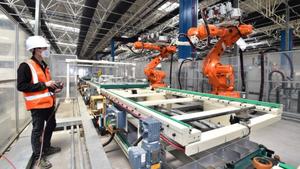 A technician adjusts the arms of robots at a new energy vehicle manufacturing plant in Yiwu, Zhejiang province. (LYU BIN / CHINA DAILY)
A technician adjusts the arms of robots at a new energy vehicle manufacturing plant in Yiwu, Zhejiang province. (LYU BIN / CHINA DAILY)
BEIJING — The purchasing managers' index (PMI) for China's manufacturing sector stood at 35.7 in February, down from 50 in January, the National Bureau of Statistics (NBS) said Saturday.
A reading above 50 indicates expansion, while a reading below reflects contraction.
The sharp decline resulted from the impact of the novel coronavirus outbreak, said NBS senior statistician Zhao Qinghe.
In breakdown, all 21 surveyed industries of the manufacturing sector stayed in the contraction zone, but the impact of the virus varied in different industries, said Zhao.
The sharp decline resulted from the impact of the novel coronavirus outbreak, said NBS senior statistician Zhao Qinghe
ALSO READ: Virus control, economy seen as priorities
The PMI for industries, including chemical fiber and automobiles, were below 30, while that for food and beverages stayed above 42, supported by the government's production and supply guarantee polices.
On a month-on-month basis, the sub-index for new orders came in at 29.3, 1.5 points higher than that for production, signaling a relatively good market demand in February, NBS data showed.
Imports and exports saw rising pressure in February, said Zhao, as the sub-indices for new export orders and imports declined to 28.7 and 31.9, respectively, affected by order cancellations and delays in delivery amid the epidemic.
Saturday's data also showed China's February composite PMI dropped marginally to 28.9 from 53 in January, indicating slower expansion in the overall production of China's companies.
Although the epidemic has given a hard blow to the business activities of China's enterprises in the short term, the growing positive trend of China's fight against the virus and the gradual work and production resumption will bring down the negative impact and restore market confidence, said Zhao.
As of Feb 25, the work resumption rate in NBS surveyed large and mid-sized enterprises nationwide has reached 78.9 percent, and it is expected to climb to 90.8 percent by the end of March, according to the NBS.
Meanwhile, the recent supporting policies of easing tax and fee burdens, rent reductions and stabilizing employment have been gradually implemented, which will effectively alleviate difficulties for enterprises and further boost their confidence, said Zhao.
The PMI for March is expected to improve, he added.
The purchasing managers' index (PMI) for China's non-manufacturing sector came in at 29.6 in February, down from 54.1 in January
Non-manufacturing PMI drops in February
The purchasing managers' index (PMI) for China's non-manufacturing sector came in at 29.6 in February, down from 54.1 in January, the NBS said.
In breakdown, 19 of the surveyed 21 industries of the non-manufacturing sector stayed in the contraction zone while the sub-index for business activities in the financial sector came in at 50.1, maintaining in the expansion zone and playing a key role in the epidemic prevention and the development of the economy, said Zhao.
The service sector has experienced a decline. The sub-index for business activities in the service sector stood at 30.1 this month, lower than the reading of 53.1 in January.
While decline was recorded in telecommunications and Internet and software industries, their sub-readings were above the overall level of the service sector thanks to the development of cloud office, online education and remote diagnosis,said Zhao.
The sub-indexes for business activities and new orders in the construction sector came in at 26.6 and 23.8 in February, respectively, both of which decreased from last month.
READ MORE: Xi chairs leadership meeting on epidemic control, economy
The sub-reading for the non-manufacturing sector's business expectations also declined to 41.8 in February, but the sub-reading of the civil engineering sector's business expectations reached 51.8, staying above 50 as enterprises in the sector were optimistic about market recovery, said Zhao.


